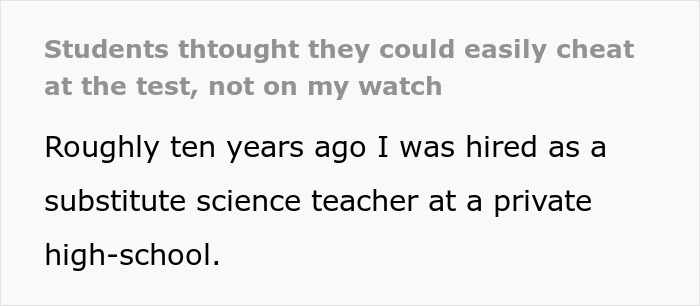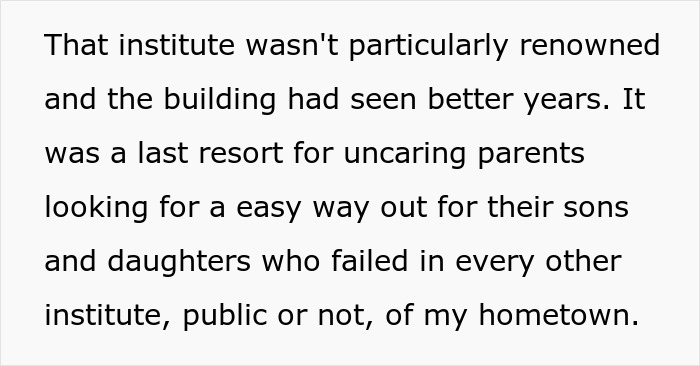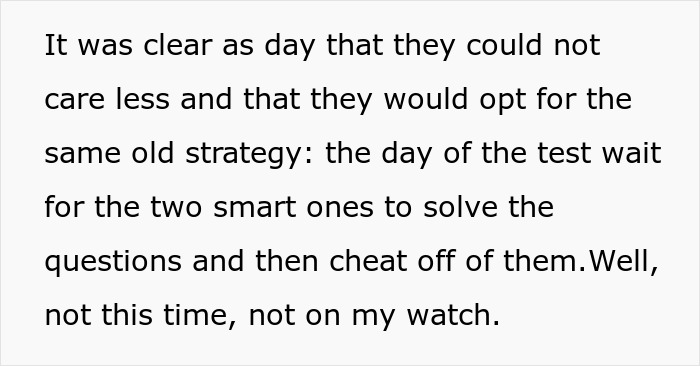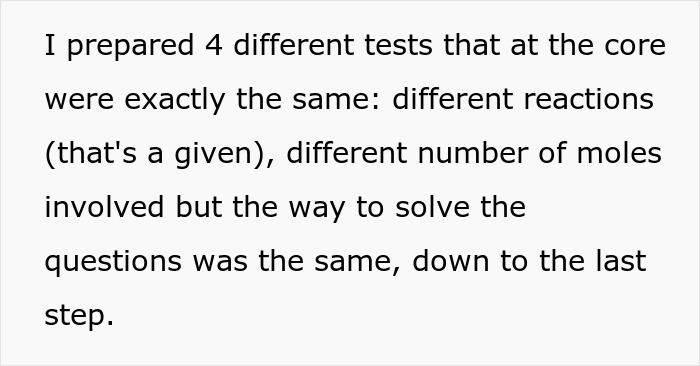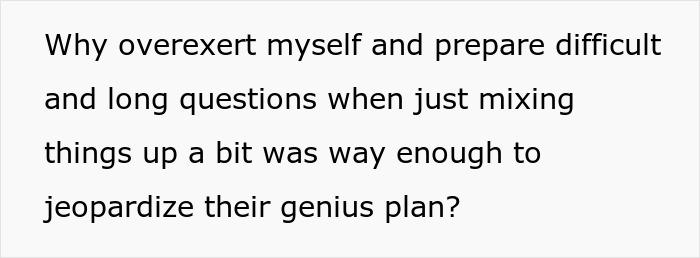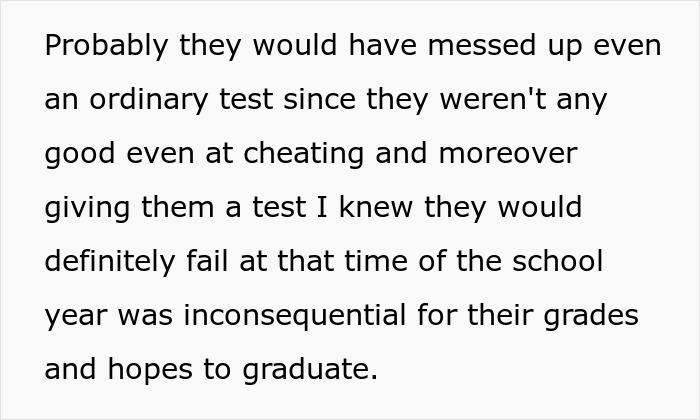Teacher Finds The Perfect Way To Expose Cheating Students
We all know that cheating is wrong. It shows a lack of character. It’s unfair to your classmates. It’s disrespectful toward the entire academic community. And it disappoints the people who invested in your education. However, this doesn’t deter some students. They think that they can ‘easily’ get away with bending the rules.
However, some educators don’t take this sort of behavior lightly. Case in point, redditor u/C05m1c-VagRant revealed how they messed up their students’ plans to cheat off each other in a simple but creative way. Read on for the story in full. Bored Panda has reached out to the author via Reddit, and we’ll update the article as soon as we hear back from them.
Some students believe that they can get away with cheating on tests
Image credits: Pixabay / pexels (not the actual photo)
One substitute teacher went viral after sharing how they put an end to their students’ constant copying off of each other
Image credits: Ivan Samkov / pexels (not the actual photo)
Image credits: Louis Bauer / pexels (not the actual photo)
Image credits: C05m1c-VagRant
Some students feel pressured to get good grades at all costs; others want to take the easy way out to save time
There are lots of different reasons why students might choose to cheat. Though it’s easy to empathize with the young adults in most of these situations, it still doesn’t excuse cheating.
The students might not have prepared enough for a test. Perhaps they don’t understand the material they’re working with, or they have an overwhelmingly unfair academic workload.
They might be under enormous stress to get excellent grades, whether due to parental expectations or the requirements to get into a good college. Or the staff at their school or university are underqualified, demotivated, or burned out and can’t teach the material properly.
Or… the students might simply be lazy, entitled, and unwilling to study.
How you try to solve the problem is going to depend a lot on the specifics of the situation. For example, if the workload is genuinely unrealistic, the academic institution may need to rework the curriculum.
Similarly, if the teaching staff lack motivation and have little to no experience, the school or university needs to take measures to train them and offer them fair compensation. Alternatively, they need to look for additional capable educators to join their institution.
All of these changes require flexible and agile school administrations. Not only do they need to acknowledge that there are problems, but they also need to be proactive enough to fix them.
Educators need to set very clear expectations and take a strict stance on cheating
Things get a lot murkier when you’re dealing with deep-seated laziness. Motivation has two sides. Yes, the staff needs to find ways to make education fun, relatable, and engaging. On the flip side, the students also have responsibility: they have to be willing to put in the work to learn the material.
Teachers need to talk to their students about the benefits of working hard, smart, and fairly. They have to emphasize how the end goal isn’t just good grades but developing a good work ethic. One that is going to benefit them throughout their entire lives. Meanwhile, it might also be useful to emphasize how these sorts of decisions (i.e. to cheat vs. to have integrity) reveal a person’s values and character.
On top of that, they could talk to their students about how cheating is only a temporary crutch. At some point, they’re going to get into a lot of trouble by bending the rules.
Whether or not the students are open to hearing this info will depend almost entirely on their relationship with their teachers. We tend to be more willing to listen to someone whom we admire.
Essentially, this means that a teacher’s job goes beyond the curriculum. It’s about being a mentor and a role model. It’s about creating a sense of trust and mutual respect.
However, developing that sort of rapport takes months and even years. And it’s not something all educators are willing to do if they’re feeling underappreciated and underpaid.
According to research conducted by Dr. Donald McCabe from Rutgers, The State University of New Jersey, students want educators to clearly communicate expectations and encourage them to abide by non-cheating policies. Moreover, students would like the academic staff to develop consistent grading policies and punish cheating in a strict but fair manner. They’d also like it if institutions took steps to remove the opportunities to cheat, as well as replace incompetent and apathetic teaching assistants.
Many people found the story interesting, so they shared their thoughts in the comments
A few readers shared similar stories about students cheating
[ad_2]
We all know that cheating is wrong. It shows a lack of character. It’s unfair to your classmates. It’s disrespectful toward the entire academic community. And it disappoints the people who invested in your education. However, this doesn’t deter some students. They think that they can ‘easily’ get away with bending the rules.
However, some educators don’t take this sort of behavior lightly. Case in point, redditor u/C05m1c-VagRant revealed how they messed up their students’ plans to cheat off each other in a simple but creative way. Read on for the story in full. Bored Panda has reached out to the author via Reddit, and we’ll update the article as soon as we hear back from them.
Some students believe that they can get away with cheating on tests
Image credits: Pixabay / pexels (not the actual photo)
One substitute teacher went viral after sharing how they put an end to their students’ constant copying off of each other
Image credits: Ivan Samkov / pexels (not the actual photo)
Image credits: Louis Bauer / pexels (not the actual photo)
Image credits: C05m1c-VagRant
Some students feel pressured to get good grades at all costs; others want to take the easy way out to save time
There are lots of different reasons why students might choose to cheat. Though it’s easy to empathize with the young adults in most of these situations, it still doesn’t excuse cheating.
The students might not have prepared enough for a test. Perhaps they don’t understand the material they’re working with, or they have an overwhelmingly unfair academic workload.
They might be under enormous stress to get excellent grades, whether due to parental expectations or the requirements to get into a good college. Or the staff at their school or university are underqualified, demotivated, or burned out and can’t teach the material properly.
Or… the students might simply be lazy, entitled, and unwilling to study.
How you try to solve the problem is going to depend a lot on the specifics of the situation. For example, if the workload is genuinely unrealistic, the academic institution may need to rework the curriculum.
Similarly, if the teaching staff lack motivation and have little to no experience, the school or university needs to take measures to train them and offer them fair compensation. Alternatively, they need to look for additional capable educators to join their institution.
All of these changes require flexible and agile school administrations. Not only do they need to acknowledge that there are problems, but they also need to be proactive enough to fix them.
Educators need to set very clear expectations and take a strict stance on cheating
Things get a lot murkier when you’re dealing with deep-seated laziness. Motivation has two sides. Yes, the staff needs to find ways to make education fun, relatable, and engaging. On the flip side, the students also have responsibility: they have to be willing to put in the work to learn the material.
Teachers need to talk to their students about the benefits of working hard, smart, and fairly. They have to emphasize how the end goal isn’t just good grades but developing a good work ethic. One that is going to benefit them throughout their entire lives. Meanwhile, it might also be useful to emphasize how these sorts of decisions (i.e. to cheat vs. to have integrity) reveal a person’s values and character.
On top of that, they could talk to their students about how cheating is only a temporary crutch. At some point, they’re going to get into a lot of trouble by bending the rules.
Whether or not the students are open to hearing this info will depend almost entirely on their relationship with their teachers. We tend to be more willing to listen to someone whom we admire.
Essentially, this means that a teacher’s job goes beyond the curriculum. It’s about being a mentor and a role model. It’s about creating a sense of trust and mutual respect.
However, developing that sort of rapport takes months and even years. And it’s not something all educators are willing to do if they’re feeling underappreciated and underpaid.
According to research conducted by Dr. Donald McCabe from Rutgers, The State University of New Jersey, students want educators to clearly communicate expectations and encourage them to abide by non-cheating policies. Moreover, students would like the academic staff to develop consistent grading policies and punish cheating in a strict but fair manner. They’d also like it if institutions took steps to remove the opportunities to cheat, as well as replace incompetent and apathetic teaching assistants.
Many people found the story interesting, so they shared their thoughts in the comments
A few readers shared similar stories about students cheating
Read original article here

